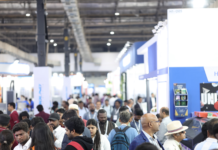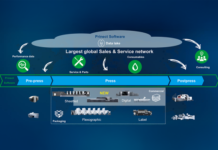In 2008, Olympic Prints started off as a photo copy centre. However, with the rise in demand for commercial printing in the industrially developing regions of Madurai, the business soon expanded to offset and digital printing. Rafeek Raja, owner of Olympic Prints, has witnessed the gradual development of printing in Tamil Nadu the southern most state of India – with customers steadily demanding higher quality that warranted the use of specialized machinery.
On the offset side, Olympic uses an FFEI internal drum plate setter with a separate laser to detect the edge of the plate, allowing precise plate-to-plate registration. “Our plate setter uses twin lasers to expose TechNova Viostar plates for high speed production of plates for better accuracy and precision,” says Raja. Olympic’s 4-color Heidelberg SM 52 offset press produces short run projects of as few as 150-200 copies.
Digital printing started with the Ricoh Pro C751 in 2008 and since then, Olympic Prints has a total of eight Ricoh digital presses in addition to its two Konica Minolta presses in its plants in Madurai, Nagercoil, Theni and Salem. “Our digital print run started with the Ricoh and since then, we have been successfully meeting all our customers needs through this machine. It is an investment that we are proud of,” says Raja. The Ricoh Pro C751 uses a vertical cavity surface emitting laser technology which produces 4800 dpi image with chemical PxP toners and oil-less technology for smooth, accurate and visually appealing image quality.
Restating its confidence in Ricoh, Olympic Prints will be installing its eleventh digital press – a new Ricoh Pro C751 in second half of April at its Nagercoil plant in Tamil Nadu.
With offset and digital technology, Olympic offers both color and monochrome printing for any run size. The company was quick to understand the importance of short run work, hence the Ricoh was simultaneously installed along with the Heidelberg, which together provide a wide and versatile gamut of services to existing and new customers. Speaking of the Ricoh pro C751, Raja says, “Its performance is great and our costs can be kept low. This enables us to have a faster return on our investments, which is crucial for printers in smaller markets like Madurai.” He is also pleased with the service back-up provided by Ricoh. “They have two dedicated service engineers who take care of any technical glitch that occurs and we are back on our process,” says Raja.
Regarding the commercial printing industry in South India, Raja envisages 20 to 25% growth for the digital print segment driven by demand for customization and short runs. “Our customers are
apprehensive of keeping inventories, so they prefer smaller quantities which can delivered on time and cost can be recovered,” says Raja.
However, the price of raw materials remain a cause of concern. “Paper and ink prices have all witnessed substantial increases in the past few years and we cannot increase the prices of our products due to prior commitments,” says Raja. Availability of electricity is another infrastructural issue which plagues the printing businesses in the state and while power back up systems are in place, better grid connectivity and uninterrupted power supply would ease their operational woes.


















